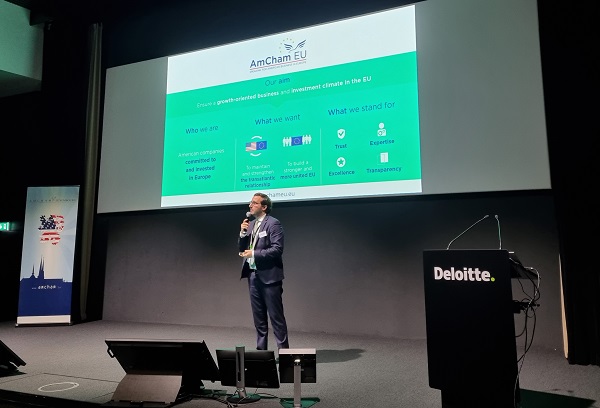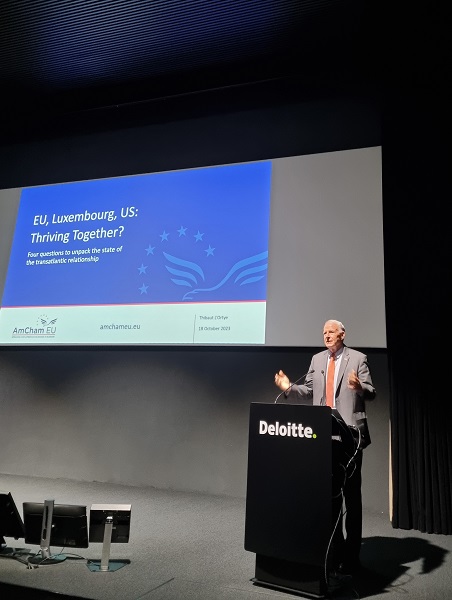 Thibaut L'Ortye, Director of Public Affairs at AmCham EU;
Credit: Jazmin Campbell / Chronicle.lu
Thibaut L'Ortye, Director of Public Affairs at AmCham EU;
Credit: Jazmin Campbell / Chronicle.lu
On Wednesday 18 October 2023, the American Chamber of Commerce in Luxembourg (AMCHAM), together with Deloitte and the Luxembourg American Chamber of Commerce (LACC) in New York, held an event dedicated to "Transatlantic Trade and Investment".
This event, held at Deloitte in Cloche d'Or, brought together some 100 guests, including fourteen business representatives who had travelled over to Luxembourg on a trade mission with LACC. The speakers were AMCHAM Chairman and CEO Paul Schonenberg, the US Ambassador to Luxembourg, Thomas Barrett, the Deputy Chief of Staff at Luxembourg's Ministry of the Economy, Luc Decker, and the Director of Public Affairs at AmCham EU in Brussels, Thibaut L'Ortye.
The latter presented an overview of the findings of "The Transatlantic Economy 2023" report, which is based on research carried out by Daniel Hamilton and Joseph Quinlan from the Foreign Policy Institute of the School of Advanced International Studies at Johns Hopkins University and the Transatlantic Leadership Network.
In his opening remarks, Deloitte Managing Partner John Psaila highlighted the importance of Luxembourg and the European Union's relationship with the United States in an uncertain world. Similarly, in his welcome address, AMCHAM's Paul Schonenberg described the EU-US trade relationship as "the strongest the planet has ever seen". He also reflected on the historic ties that bind Luxembourg and the United States.
Ambassador Barrett later elaborated on these historic relations, touching in particular on those between Luxembourg and his home state of Wisconsin, which saw an influx of Luxembourgish immigrants in the 1800s. Amid the ongoing Israeli-Palestinian conflict, the US Ambassador dedicated part of his speech to the United States' support for Israel but also the need to address the humanitarian concerns of Palestinian civilians. He recalled that US President Joe Biden is currently in Israel on a "courageous" diplomatic visit.
Returning to the transatlantic relationship, Ambassador Barrett stressed that the US and the EU are each other's most important trade and commercial partners. He noted the "significant" role played by Luxembourg in US-EU economic relations, highlighting cooperation in areas such as space. He also stressed the importance of continuing to work together to "seize opportunities" and "tackle global challenges".
Luc Decker, touching on the recent elections in Luxembourg, assured that the transatlantic relationship would remain "very high" on the agenda. He emphasised the deep bonds that unite Luxembourg and the United States, adding that it was important in today's uncertain world to know who one's "reliable partners" are. He stressed that these bonds were not just economic, but rather "built on the foundation of our friendship".
Thibaut l'Ortye then addressed the results of the "The Transatlantic Economy 2023" report in a presentation based on "Four questions to unpack the state of the transatlantic relationship". The first question was: are transatlantic relations in troubled waters? The short answer was "no", he said, going on to emphasise the need to look at the "bigger picture", i.e. the strong economic relationship and not just policy disagreements.
The second question raised was: what do I need to know about the transatlantic economy? Here, Thibaut l'Ortye presented five key takeaways from the report. Firstly, one should look not only at trade, but also at investment, which is the "biggest driver" of this relationship. Secondly, the transatlantic energy landscape is changing, for example in terms of dependencies and green policies. Thirdly, the EU and the US are digital leaders. Fourthly, strategic dependencies have risen to the top of the agenda and led to calls for derisking. The final takeaway was that EU-China trade relations have been overplayed: US-EU goods trade reached a record $909.5 billion in 2022, which exceeded both the EU-China ($897.3 billion) trade in goods and the US-China ($690.6 billion) goods trade.
Another question was: why does this matter for Luxembourg? Looking at the figures for bilateral trade and investment, foreign direct investment (FDI) by the US in Luxembourg reached $715.6 billion in 2021 and FDI by Luxembourg in the US amounted to $382.9 billion. US goods exports to Luxembourg in 2021 totalled $1.5 billion, while imports from Luxembourg reached $0.6 billion. Similarly, US services exports to Luxembourg totalled $9.2 billion and imports from Luxembourg amounted to $2.3 billion in 2021.
Finally, Thibaut l'Ortye addressed the top issues for businesses to watch out for, including looking at whether policies are converging or diverging on either side of the Atlantic (e.g. on sustainability, digitalisation and China) and how to ensure there is more convergence. Another issue was the rise of protectionism; he described Luxembourg as a good example of a European country which understands the importance of openness and stressed the need to look at ways that Europe can continue to be open. He also highlighted ongoing discussions, for example the EU-US Summit which is taking place on Friday 20 October 2023 and the EU-US Trade and Technology Council (TTC).
He added that businesses have a role to play and can support this relationship by speaking out about its importance, advocating an ambitious agenda for EU-US cooperation and investing their time in contributing as the EU and the US set global standards.
The full report can be downloaded as a PDF from the AmCham EU website: https://www.amchameu.eu/publications/transatlantic-economy-2023.
The event concluded with a networking lunch.

US Ambassador to Luxembourg, Thomas Barrett (Credit: Jazmin Campbell / Chronicle.lu)









